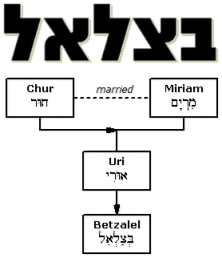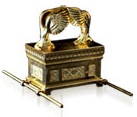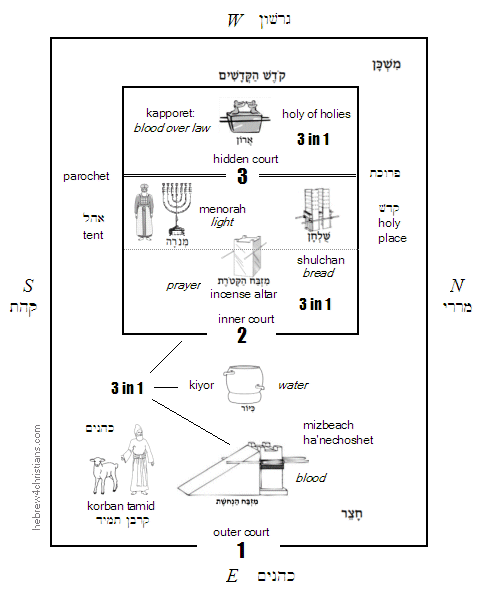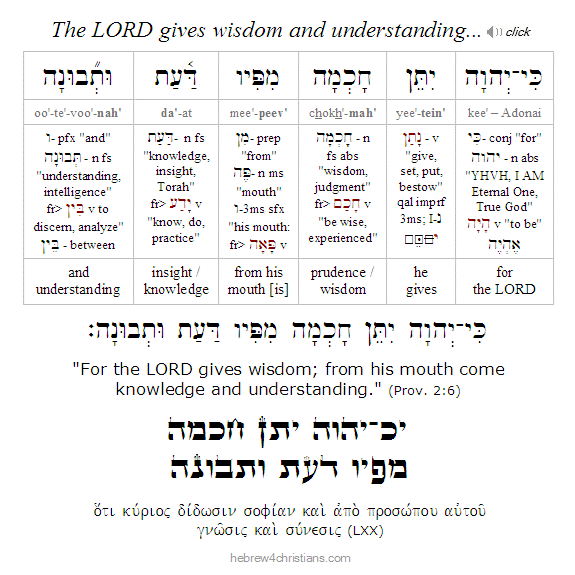|
|
|||||||||||||||||||||
 |
|||||||||||||||||||||
 |
|||||||||||||||||||||
|
|
||||||||||||||||||||||||||||
|
When Moses received Torah at Sinai, he was given visions of the Tabernacle (i.e., Mishkan: מִשְׁכָּן), a tent-like structure where God's Presence (i.e., Shekhinah: שְׁכִינָה) would dwell (i.e., shakhan: שָׁכַן) in the midst of the camp of Israel. Though Moses received the "pattern" (i.e., tavnit: תַּבְנִית) of the heavenly dwelling, he was apparently unable to create the artifacts themselves, and therefore God called a young man named "Betzalel ben Uril" (בְּצַלְאֵל בֶּן־אוּרִי) to be the chief architect of the structure. |
 |
||||||||||||
|
Betzalel is clearly a type (or picture) of the Messiah Yeshua. For consider, he was a man "called by name" from the tribe of Judah who was "filled with the Spirit of God" (ruach Elohim) to build the dwelling place of the LORD - an apt enough description of the Lord Yeshua Himself. Moses was said to be so astonished at Betzalel's abilities that he said Betzalel must have been "in the shadow" while he received his visions at Sinai (Betzel El Hayita - "you were indeed in the shadow, for you have the ability to create what the Holy One, blessed Be He, had commanded me"). Indeed, the name Betzalel (בְּצַלְאֵל) means "in the shadow of God" (from בְּ [in] + tzel [צֵל], "shadow" + El [אֵל], "God"). Moreover, Betzalel's chief assistant was Oholiav (אָהֳלִיאָב), a name that means "my Father's tent" (from oheli [אָהֳלִי], "my tent" and av [אָב], "father"). Therefore, holy brothers, you who share in a heavenly calling, consider Yeshua, the Apostle (הַשָּׁלִיחַ) and the High Priest (הַכּהֵן הַגָּדוֹל) of our confession, who was faithful to him who appointed him, just as Moses also was faithful in all God's house. For Yeshua has been counted worthy of more glory than Moses - as much more glory as the builder of a house has more honor than the house itself. (For every house is built by someone, but the builder of all things is God.) Now Moses was faithful in all God's house as a servant, to testify to the things that were to be spoken later, but the Messiah is faithful over God's house as a son. And we are his house if indeed we hold fast our confidence and our boasting in our hope. The Torah states that God endowed Betzalel with the Spirit of God (רוּחַ אֱלהִים), and with wisdom (חָכְמָה), understanding (תְּבוּנָה), and knowledge (דַּעַת) - the same attributes used to describe God as the Creator of the Universe (Exod. 35:31; Prov. 3:19-20). According to the Talmud, Betzalel was just 13 years old when he began building the Tabernacle. As a young man chosen by God Himself, Betzalel "came and healed the wound" that was caused by the sin of the Golden Calf (Shemot Rabbah). In addition to being the first great artist of God mentioned in the Torah, the Talmud states that Betzalel "knew how to join together the letters with which heaven and earth were created" (Berachot 53a). Indeed, as the one who knew how to fashion the "Ark of the covenant" where the blood would be presented for our atonement, he clearly foreshadowed Yeshua our Messiah....
|
||||||||||||
|
Hebrew for Christians |
||||||||||||
|
||||||||||||


